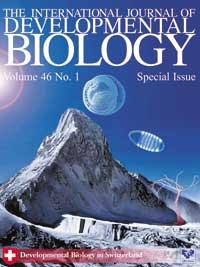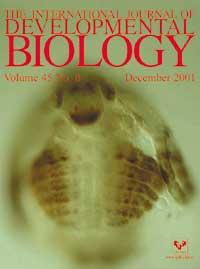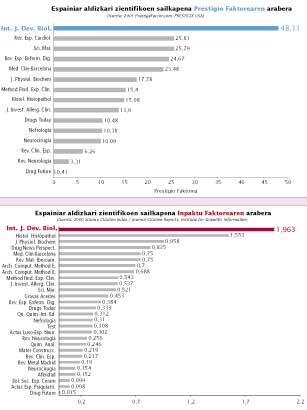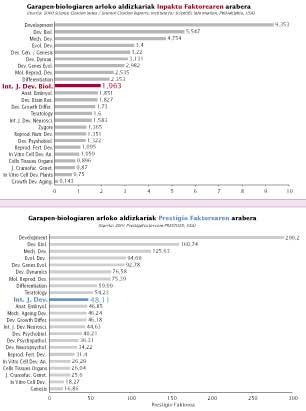The International J. of Developmental Biology looking at the world
2002/05/01 Andonegi Beristain, Garazi - Elhuyar Zientziaren Komunikazioa Iturria: Elhuyar aldizkaria
In the University of Granada there was a magazine called Anales del Desarrollo published entirely in Spanish. When Juan Aretxaga was appointed editor, he saw the need for a change. The International Journal of Developmental Biology was born with the intention of updating the journal Anales del Desarrollo, making it more competitive and opening it to the world. This idea materialized with the arrival of Juan Aretxaga to the University of the Basque Country, 14 years ago. There he found all the help the magazine needed and by chance the university's editorial service embarked on a global project. Reaching the level of the best scientific journals has been a huge job and, in addition, has been frequently criticized.

The journal is aimed at current research in biological development. The most competitive part within biology and more representative within biology and medicine. It is carried out only in English, since it is the international tool of science in language and dissemination. Proof of this are the origins of the scientists who write in the journal: Germany, Japan, USA, Canada, France, Australia, Israel, Italy, Finland, etc. All of them indicate the impact of the magazine abroad.
Quality control
Most of the results of an investigation are not patents, nor reports, but articles from a journal. Therefore, the result of a study of years is collected in journals and, depending on the reputation of the magazine, more or less researchers will publish their work on them. However, to maintain this reputation, the journal must make an exhaustive selection of the works to be published. The criteria for this selection process are internationally recognized, but are not yet considered in Spain.
The International Journal of Developmental Biology has applied these criteria from the beginning. The authors send four copies of the article, of which three are sent to three world experts in the subject. These experts, anonymous, value the article within approximately a month for the authors. If available, it is published directly, but otherwise, suggestions are sent indicating the sections to be corrected. Together with the suggestions, the article is returned to the author to make the necessary modifications. Finally, the article is sent back to the editors and published. This system is called peer-review and is known worldwide.
Besides the articles that are published, there are many articles that are cancelled. In the most prestigious journals, the rate of annulment of articles ranges from 60% to 70%, and in the case of The International Journal of Developmental Biology 40%. This rate should never be less than 25% if you want to make quality scientific disclosure. This rate, therefore, has a lot to do with quality and reputation.
Impact Factor and Prestige Factor
In addition to this rate, there are two others: Impact Factor and Prestige Factor. The reputation of The International Journal of Developmental Biology is due to these two factors. In these classifications only 26 of the 1,000 journals published in Spain are allowed. Of these, the magazine of Leioa is the first in both factors, but not now, but since it came out, that is, for 14 years.

These factors are based on objective data. For the calculation of the Impact Factor, the number of quotations from an article in journals around the world is counted. An article ends with reference sections or bibliography in which other articles or publications are indicated. These data are collected and processed through a very complex process, and each year the result is published. If an article is mentioned in other scientific writings, one can think that it is good and if all articles are good, the Impact Factor of the journal increases.
The second factor or Factor Prestige focuses on the originality of the works. That is, how many of the articles published are original and how many are revisions of previous works. Therefore, the maximum level in both factors is not easy.
Main problem Main problem
David J. Fogarty, doctor of Neurosciences by the UPV-EHU and Juan Aretxaga, professor, are responsible for this high level magazine and they are the ones who have pointed out the greatest difficulties. The most serious problem is not the lack of articles and/or experts in article correction, but the lack of support. Although until now the editorial office of the magazine was carried between two people, they are needed of another person and of subsidies. With two people it is not possible to respond to a growing market and, in addition, in recent years, with the tendency to spread the journals through the Internet, its work has increased considerably.
They also want to promote a change of mentality: the belief that quality can only be found out. The results of the investigations, that is, the articles, in most cases, go abroad and the benefits of these investigations are also expelled, to Germany, to the United States, etc. However, if one wants to promote quality in science, quality scientific journals are needed. A quality science that can be done here has also been sufficiently demonstrated with the journal The International Journal of Developmental Biology. Therefore, promoting fame and quality is in our hands.



Gai honi buruzko eduki gehiago
Elhuyarrek garatutako teknologia




